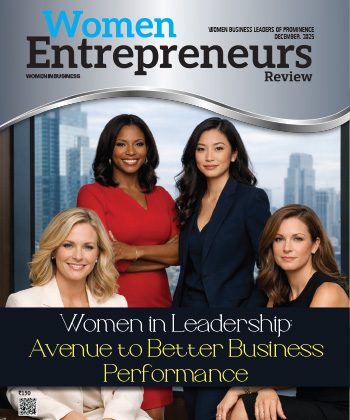
Mentorship Crucial to Boost Women's Equal Representation in Pharma
By: Suneela Thatte, VP and Head, Merck Healthcare R&D India
Suneela Thatte, Vice President and Head – R&D India for Merck KGaA, has over 30 years of experience in clinical research, operations, business management, and policy advocacy in the biopharma industry. She has been President of the Indian Society for Clinical Research for two terms and is an active member of various industry and professional associations. Suneela has focused on drug development and clinical research advocating for balanced regulations and adequate capacity for drug development.
In a recent conversation with Women Entrepreneurs Review Magazine, Suneela sheds light on the major roles played by mentorship in advancing multi-generational and women’s representation in the biopharma sector. She emphasized the implementation of three important aspects, upskilling, coaching, and mentorship for boosting leadership skills. Suneela advice women to take ownership of their own upskilling and career growth.
In the evolving landscape of the biopharma industry, how do you perceive the role of mentorship in guiding new leaders to navigate these complexities?
Mentorship is an effective tool for leaders, regardless of which industry they belong to. Both traditional and reverse mentoring are relevant in the current context of the biopharma. The younger generation, which is more adept at automation and machine learning, can act as reverse mentors for senior leaders, who can learn from younger leaders who may have less experience but are more comfortable with technology. The juniors of course have a lot to draw from knowledge and experience that seniors have to offer.
Given your extensive experience in clinical research and policy advocacy, what are the most impactful strategies you've observed for empowering women to ascend into leadership roles within the biopharma sector? How can mentorship programs be designed to support these strategies?
In most industries - while gender representation is often equal at the entry level, we frequently observe attrition among women as they advance in their careers, largely due to increasing family responsibilities. Many talented young women aspire to enter the industry and make significant contributions. However, as they progress into middle management roles, we see a decline in their numbers, as personal and professional timelines can conflict. To address this issue, organizations must adopt a flexible mindset, implementing policies that enable employees to manage personal challenges alongside corporate demands, all while remaining within the scope of their roles.
Upskilling is another strategy that helps women manage their personal space and corporate responsibilities effectively. This is a gender-agnostic approach that enhances individual effectiveness in their roles. Also mentoring and coaching are effective tools that many successful organizations use to retain the talent.
How can industry leaders use their mentorship roles to influence policy changes that promote greater inclusion and advancement of women in the biopharma sector?
Policy advocacy is a collaborative effort between various stakeholders. It involves identifying the stakeholders impacted by the change and bringing them together. This is challenging in practice, but again, mentorship can be a great tool here. Senior leaders can nurture and mentor emerging leaders, ensuring that the collective voice and resources come together for policy advocacy. However, inculcating collaboration and networking is crucial for success.
How can lessons from mentorship practices in other industries be applied to the biopharma sector to enhance the development and empowerment of women leaders?
Mentorship is a sector-agnostic practice, focusing on identifying and gaining expertise from others. It doesn't have industry-specific practices, but rather focuses on addressing specific traits in various industries. This approach doesn't require a specific sector, such as IT or manufacturing, but can be applied to various areas of development. The goal is to identify areas of development and pursue expertise wherever it's applicable.
What metrics or indicators are most effective for measuring the success and impact of mentorship programs aimed at women in the biopharma sector? How can organizations ensure these metrics align with broader business objectives?
To effectively measure the success and impact of mentorship programs aimed at women in the biopharma sector, a fundamental metric is the representation of women in leadership positions, ideally targeting a goal of 50% female leaders and defining the timeframe that you need to achieve it..
Organizations may begin by assessing the number of women candidates presented by staffing teams for entry-level positions. Following this, it is important to evaluate the overall percentage of women within the workforce, as well as the representation of women at different levels of the corporate ladder—specifically in frontline, middle management, and leadership roles. This comprehensive approach provides clear metrics. Even if a 50% ratio is achieved at the entry level, a decline in representation at higher levels indicates a need to revisit organizational strategies and policies.
To ensure these metrics remain consistent and aligned with broader business objectives, organizations should implement supportive initiatives, such as the Women in Leadership Program at Merck. This mentorship program includes coaching sessions and group discussions on topics relevant to women in the workforce. For example, returning to work after maternity leave can be emotionally challenging, and having a mentor who has experienced similar situations can be immensely beneficial. Additionally, as nuclear families become more common, it is important to extend similar mentoring opportunities to men as well, enabling them to provide support at home while fully engaging in their professional responsibilities.
How can the integration of digital technologies transform traditional mentorship models in the biopharma industry? What innovative mentorship practices will become prevalent in the near future?
Many tasks today, including both repetitive and creative ones, are increasingly managed by technology. It's evident that the younger generation tends to grasp technology more easily, prompting us to rethink traditional mentoring approaches. We should seek mentors who are subject matter experts in these areas, incorporating reverse mentoring as a valuable practice.
Looking ahead, I believe reverse mentoring will gain even greater significance. With advancements in technology, mentorship will transcend boundaries, allowing us to connect with mentors from diverse industries and geographies. This global perspective is essential as we navigate cross-cultural environments, highlighting the importance of learning not only from industry and technology but also from cultural insights.
Message for Readers
My message to all the women-Be bold, be adventurous, and raise your hand when you see an opportunity. This applies to mentorship as well. Do not wait for your organization to assign you a mentor – find one yourself. Talk to your manager about your professional goals and the skillsets you want to develop. Take charge of your growth and drive your own development!
Most Viewed
- 1 Women's Health Startup HerMD Closing Doors Amid Industry Challenges
- 2 5 Famous Women in Indian Armed Forces
- 3 Saudi Women No longer Require Male Permission for Clothing Choices, says Prince MbS
- 4 Kolkata Medtech Startup Innovodigm Raises Rs 5.5 Crore Seed Funding Led by IAN Group
- 5 Yamunanagar's Kashish Kalra Honoured after Securing 111th Rank in UPSC Civil Services Exam
- 6 Madurai Appoints Its First Woman Corporation Head
- 7 IAS Vijayalakshmi Bidari Appointed as the new Nagpur Divisional Commissioner
- 8 American Entrepreneur Lucy Guo Overtakes T Swift to become Youngest Female Billionaire
- 9 ICC Women's World Cup 2025 Trophy Showcased at Indore's Holkar Stadium
- 10 Aparna Saxena's Beauty Venture AntiNorm Launches in India
- 11 Vidya Nataraj Co-Founded BlueStone Jewellery & Lifestyle files IPO
- 12 5 Women Freedom Fighters of India
- 13 Dr. G Krishnapriya appointed as CEO for Trichy
- 14 M3M & Sirona Partner to Introduce Menstrual Hygiene Vending Machines in 15 Locations
- 15 Punjab Govt launches SHE Cohort 3.0 Supporting Tech-led Women Startups
- 16 Indian origin Lawyer, Sweena Pannu appointed as the US New Superior Court Judge
- 17 The Aurora Tech Award recognizes 4 Indian Women-led Startups
- 18 Kerala's Republic Day parade featured an all-female tableau
- 19 Manisha Kabbur Becomes Karnataka's First Woman International Karate Coach
- 20 Director K. S. Ravikumar's Daughter Maalica Ravikumar Launches Life Coaching Company 'Evergrowth Academy' for Women
- 21 Leezu's Raises Pre-Seed Funding to Accelerate Growth in Sexual Wellness Industry
- 22 Sattu: Super-easy summer drink for PCOS gut healing
- 23 Swathi Nelabhatla creates Sitha App, India's First Women-Exclusive Gig Platform
- 24 7 Timeless Female Kathak Dancers & their Iconic Legacies
- 25 Meet 7 Iconic Women Architects of Modern India & their Most Impactful Work
- 26 This Woman-led Insuretech Startup is Helping Bridge the Education Financing Gap in India
- 27 Women Leaders Share Lessons Learnt from India Women's WC Win
- 28 5 Enterprising Women Founders Powering Singapore's Tech & Innovation Landscape
- 29 4 Women. 4 Stories. One Vision for Smarter, Stronger Healthcare
- 30 Global Gender Gap Narrows to 68.8%, But Full Equality 123 Years Away: WEF Report 2025
- 31 Changemakers: 7 Women Entrepreneurs Taking the Make in India Movement Forward
- 32 Meet Lucy Guo, The Youngest Self-Made Female Billionaire Disrupting Tech
- 33 How Women are Driving India's Festive Online Shopping Surge






